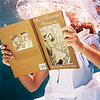You need to sign in or sign up before continuing.
Take a photo of a barcode or cover

quadrille 's review for:
The Amber Spyglass
by Philip Pullman
I am emotionally compromised all over again, approximately some 15 years after I first read this book.
Despite all that time, it’s amazing how much of this still felt familiar, and how much I remembered. The ending is still painful, and at 518 pages, this one’s the longest of the series, and it felt like it took me quite a while to get through it. The pacing & plotting is honestly kind of messy as Pullman wraps it all up — e.g..
So [b:The Golden Compass|119322|The Golden Compass (His Dark Materials, #1)|Philip Pullman|https://images.gr-assets.com/books/1505766203s/119322.jpg|1536771] remains the very best of the series, imo, but I still dug this one. This series gets a lot of flak for its anti-religion message, but I think that reputation is overblown. Yes, the Church is corrupt in Pullman’s world, but at the underlying heart of the series is the message of how everything is connected, and there is purpose in life. It’s got a lovely ending, with the main characters backed into a corner and yet a message about making the best of the world, taking care of it, and taking care of each other. And what’s so bad about that?
The series is pretty dark as always (the ‘Will is almost endangered by a pedophilic priest’ scene is especially… ummm), but as a kid, I didn’t even notice how horrific it was: because I focused on the adventure, the war, the vivid imagery of the dark, dreary land of the dead.
It’s also interesting revisiting this series as an older reader. Because I still love Lyra and Will, of course, but this time around I found my attention most drawn to Lord Asriel and Mrs. Coulter, their complicated tangledy relationship and double-crossings and shifting allegiances. Asriel’s fierce, fierce pride in Lyra. Mrs. Coulter’s little seed of goodness. I almost wish there had been more of this couple (I would take spinoffs, pls and ty!).
But just, man. That ending.
Also stand-out moments: The sulky sassy angel Balthamos and his odd-couple journey with Will. The best.
I think one of my favourite points in this book is the delicate balance of nature in the mulefa world — plus the fact that, as a sentient species that evolved a trunk rather than hands, the mulefa have to work in pairs to tie knots etc. And Mary wonders if humans are too isolated from each other by comparison, too solitary and independent.
I wonder that, too.
At some point when my head isn’t killing me I’ll edit in favourite quotes. The ‘lantern-slides’ (small drabbles from the cutting-room floor) in this edition are wonderful little bite-sized pieces of prose, as always; one of them also reveals that, post-series,.
Despite all that time, it’s amazing how much of this still felt familiar, and how much I remembered. The ending is still painful, and at 518 pages, this one’s the longest of the series, and it felt like it took me quite a while to get through it. The pacing & plotting is honestly kind of messy as Pullman wraps it all up — e.g.
Spoiler
the Father Gomez arc falls away, Mary’s time with the mulefa is really sluggish compared to the spying/war/death happening elsewhere, and even in the ending it’s unclear what actually saves the world besides two kids just falling in love (how does this affect the universe??)So [b:The Golden Compass|119322|The Golden Compass (His Dark Materials, #1)|Philip Pullman|https://images.gr-assets.com/books/1505766203s/119322.jpg|1536771] remains the very best of the series, imo, but I still dug this one. This series gets a lot of flak for its anti-religion message, but I think that reputation is overblown. Yes, the Church is corrupt in Pullman’s world, but at the underlying heart of the series is the message of how everything is connected, and there is purpose in life. It’s got a lovely ending, with the main characters backed into a corner and yet a message about making the best of the world, taking care of it, and taking care of each other. And what’s so bad about that?
The series is pretty dark as always (the ‘Will is almost endangered by a pedophilic priest’ scene is especially… ummm), but as a kid, I didn’t even notice how horrific it was: because I focused on the adventure, the war, the vivid imagery of the dark, dreary land of the dead.
It’s also interesting revisiting this series as an older reader. Because I still love Lyra and Will, of course, but this time around I found my attention most drawn to Lord Asriel and Mrs. Coulter, their complicated tangledy relationship and double-crossings and shifting allegiances. Asriel’s fierce, fierce pride in Lyra. Mrs. Coulter’s little seed of goodness. I almost wish there had been more of this couple (I would take spinoffs, pls and ty!).
But just, man. That ending.
Also stand-out moments: The sulky sassy angel Balthamos and his odd-couple journey with Will. The best.
I think one of my favourite points in this book is the delicate balance of nature in the mulefa world — plus the fact that, as a sentient species that evolved a trunk rather than hands, the mulefa have to work in pairs to tie knots etc. And Mary wonders if humans are too isolated from each other by comparison, too solitary and independent.
I wonder that, too.
At some point when my head isn’t killing me I’ll edit in favourite quotes. The ‘lantern-slides’ (small drabbles from the cutting-room floor) in this edition are wonderful little bite-sized pieces of prose, as always; one of them also reveals that, post-series,